Emha Ainun Nadjib, Kiai Kanjeng and the Dynasty Theatre at Jakarta’s Gedung Kesenian, April 2009
On the evening of Friday April 3, at the Gedung Kesenian in Central Jakarta’s Pasar Baru, a remarkable performance was held. Emha Ainun Nadjib, a leading poet, writer and social activist took the stage with long-term collaborators gamelan fusion orchestra Kiai Kanjeng and the newly-reformed Dynasty Theatre. What followed was a dynamic three-hour blend of music, drama, poetry and dialogue.
Entitled “Jangan Cintai Ibu Pertiwi”, the evening focused on topical affairs and current events. The curtains rose on a ten-strong gamelan troupe accompanied with a classically-trained violinist, guitar, bass and keyboard, and vocalists. One of the two female vocalists was Novia Kolopaking, an musical artist and actress in her own right and married to Nadjib.
The music commenced slowly, building into a piece know as “Bambang Wetan”; the rising of the east. On stage, a number of sleeping forms were roused one by one by a couple of actors, as the mournful song progressed. That set the scene for a dramatic sketch concerning Indonesia’s “Ibu Pertiwi” (mother earth or mother land) by the Dynasty Theatre players. On a large screen the picture was constantly changing; the graphics were very good.
The music shifted focus and a new song began. It was a variation on Kiai Kanjeng’s “Sayang Padaku” with Novia Kolopaking on lead vocals. It’s the title track of one of her recent album releases. The screen provided a backdrop of the recent Situ Gintung lake disaster as the song played out. Between songs Emha himself would take the stage and recite, and the Dynasty Theatre players continued to act out sketches and dramatic dialogue on the theme of the desecration of mother earth; hence the focus on Situ Gintung.
After an interval, the mood changed and Emha returned to the stage and sat down, ready to engage the audience directly. The theatre is not, at least in Indonesia, the typical setting for the group. They are more likely to be found performing in the provinces in a sports field or other large open space. Touring constantly, they perform up to fifteen times a month across Indonesia. Each month there are scheduled gatherings know as “Maiyah” in Jakarta, Semarang, Yogyakarta, Malang, Surabaya and Jombang (East Java – Emha’s birthplace). They are more likely to see the inside of a theatre abroad, having toured extensively in Europe, Asia and Australia.
Emha is a natural comedian and he immediately set to work on current affairs, poking fun at political parties and their election campaigns, challenging the religiously over-pious and taking good-natured though humorous pot shots at national figures, of whom there are usually a few at such performances. The dialogue was interspersed with more songs, including a cover of Nat King Cole’s Love by the two female vocalists. This was given the classic jazz treatment but half way through this morphed into a hard rock version.
The main substance of the commentary concerned interfaith and inter-communal relations, with Emha referring to the group’s recently acclaimed tour of the Netherlands. There they played theatres, churches and mosques in seven cities, engaging in dialogue with politicians, priests and rabbis, appearing on TV in a host of other forums. The tour included discussions at a progressive synagogue and Emha referred to an agreement that had been signed by national representatives of the Jewish, Christian and Muslim faiths to good relations among each other. It has been rare for Indonesian Muslim leaders to actively engage with their Jewish counterparts. It is an active part of Kiai Kanjeng’s cultural diplomacy that they do so.
Emha said that we would have to finish at 10.00 pm but that they would probably be able to stretch it a little and the evening wound up just before half past. The climax came in the form of two songs. One; a version of Letto’s recent hit “Sebelum Cahaya” and finally, a classic Islamic song of praise, accelerating and peaking in the repetition of “Allahu”, until an exhausted Emha, with a broken voice, said goodnight and thanked the audience.
Such performances really are Indonesia’s best kept secret. Interested readers may like to view http://padhangmbulan.com/ for Emha’s recent writings and scheduled events. He appears monthly (generally the evening of the second Friday of the month) at Cikini’s Taman Ismail Marzuki in Central Jakarta.
Ian L. Betts is the author of “Jalan Sunyi Emha” on the life and work of Emha Ainun Nadjib. He works with Emha Ainun Nadjib and Kiai Kanjeng, frequently accompanying them overseas.
On the evening of Friday April 3, at the Gedung Kesenian in Central Jakarta’s Pasar Baru, a remarkable performance was held. Emha Ainun Nadjib, a leading poet, writer and social activist took the stage with long-term collaborators gamelan fusion orchestra Kiai Kanjeng and the newly-reformed Dynasty Theatre. What followed was a dynamic three-hour blend of music, drama, poetry and dialogue.
Entitled “Jangan Cintai Ibu Pertiwi”, the evening focused on topical affairs and current events. The curtains rose on a ten-strong gamelan troupe accompanied with a classically-trained violinist, guitar, bass and keyboard, and vocalists. One of the two female vocalists was Novia Kolopaking, an musical artist and actress in her own right and married to Nadjib.
The music commenced slowly, building into a piece know as “Bambang Wetan”; the rising of the east. On stage, a number of sleeping forms were roused one by one by a couple of actors, as the mournful song progressed. That set the scene for a dramatic sketch concerning Indonesia’s “Ibu Pertiwi” (mother earth or mother land) by the Dynasty Theatre players. On a large screen the picture was constantly changing; the graphics were very good.
The music shifted focus and a new song began. It was a variation on Kiai Kanjeng’s “Sayang Padaku” with Novia Kolopaking on lead vocals. It’s the title track of one of her recent album releases. The screen provided a backdrop of the recent Situ Gintung lake disaster as the song played out. Between songs Emha himself would take the stage and recite, and the Dynasty Theatre players continued to act out sketches and dramatic dialogue on the theme of the desecration of mother earth; hence the focus on Situ Gintung.
After an interval, the mood changed and Emha returned to the stage and sat down, ready to engage the audience directly. The theatre is not, at least in Indonesia, the typical setting for the group. They are more likely to be found performing in the provinces in a sports field or other large open space. Touring constantly, they perform up to fifteen times a month across Indonesia. Each month there are scheduled gatherings know as “Maiyah” in Jakarta, Semarang, Yogyakarta, Malang, Surabaya and Jombang (East Java – Emha’s birthplace). They are more likely to see the inside of a theatre abroad, having toured extensively in Europe, Asia and Australia.
Emha is a natural comedian and he immediately set to work on current affairs, poking fun at political parties and their election campaigns, challenging the religiously over-pious and taking good-natured though humorous pot shots at national figures, of whom there are usually a few at such performances. The dialogue was interspersed with more songs, including a cover of Nat King Cole’s Love by the two female vocalists. This was given the classic jazz treatment but half way through this morphed into a hard rock version.
The main substance of the commentary concerned interfaith and inter-communal relations, with Emha referring to the group’s recently acclaimed tour of the Netherlands. There they played theatres, churches and mosques in seven cities, engaging in dialogue with politicians, priests and rabbis, appearing on TV in a host of other forums. The tour included discussions at a progressive synagogue and Emha referred to an agreement that had been signed by national representatives of the Jewish, Christian and Muslim faiths to good relations among each other. It has been rare for Indonesian Muslim leaders to actively engage with their Jewish counterparts. It is an active part of Kiai Kanjeng’s cultural diplomacy that they do so.
Emha said that we would have to finish at 10.00 pm but that they would probably be able to stretch it a little and the evening wound up just before half past. The climax came in the form of two songs. One; a version of Letto’s recent hit “Sebelum Cahaya” and finally, a classic Islamic song of praise, accelerating and peaking in the repetition of “Allahu”, until an exhausted Emha, with a broken voice, said goodnight and thanked the audience.
Such performances really are Indonesia’s best kept secret. Interested readers may like to view http://padhangmbulan.com/ for Emha’s recent writings and scheduled events. He appears monthly (generally the evening of the second Friday of the month) at Cikini’s Taman Ismail Marzuki in Central Jakarta.
Ian L. Betts is the author of “Jalan Sunyi Emha” on the life and work of Emha Ainun Nadjib. He works with Emha Ainun Nadjib and Kiai Kanjeng, frequently accompanying them overseas.

































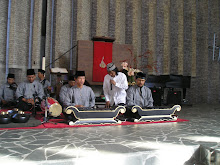
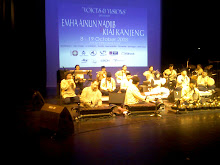

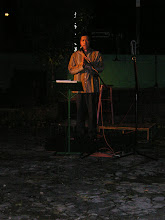



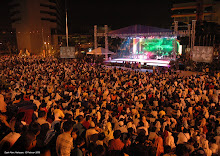
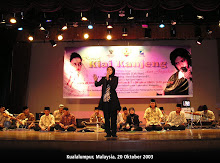
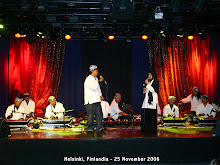.jpg)



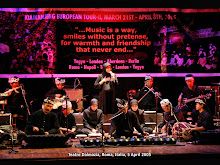


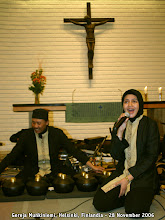.jpg)

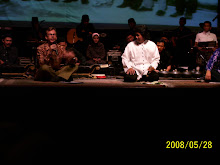.jpg)
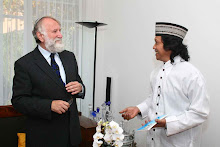
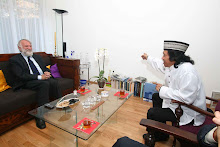
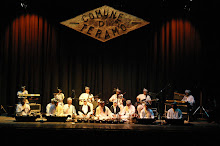


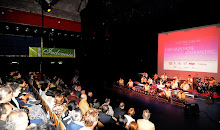

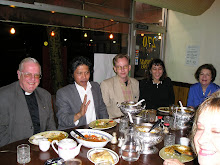


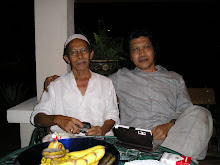
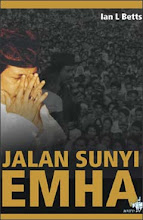
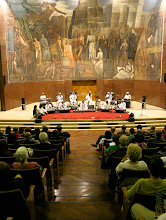
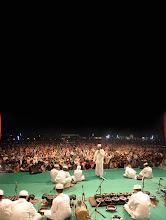

No comments:
Post a Comment